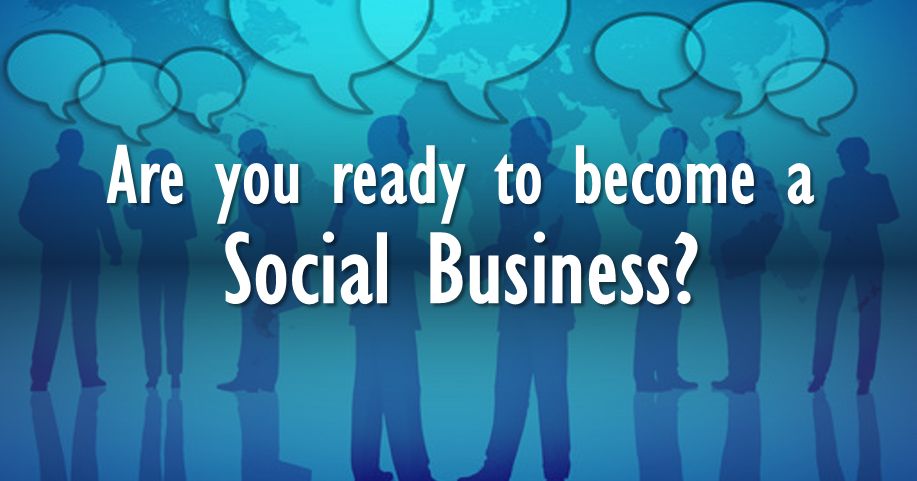What Exactly is a Social Business?
Here we go again – we have a new buzzword, all the social media experts are talking about the “Social Business”
Peter Kim defines social business [link http://www.beingpeterkim.com/2012/03/what-matters-in-social-business.html ] as “a social business harnesses fundamental tendencies in human behavior via emerging technology to improve strategic and tactical outcomes” – interesting but it sounds like something a consultant would say. IBM defines it as an agile, transparent and engaged organization (of course, they sell collaboration, community and social listening tools).
I don’t think it is that complicated. What does it mean to be a social business? To me, it is not about having a team of people monitoring Linkedin, Twitter and, if you are in the ‘leading edge’, Google+ and Pinterest. Those are tools, communication channels.

What it means to be a social business can’t be relegated to a small rapid-response, crisis-prevention team. The social strategist should be a customer interaction strategist, not the leader of a support team that is trying to move quickly to avert a Comcast-like crisis or a United breaks guitars viral video incident. There is no formula to make content viral either.
To me, running a social business has a much deeper meaning. I say ‘deeper’ because it requires a fundamental culture change that spreads across the business and changes the way the business operates.
Social Business is about being sincerely interested in listening to customers and empowering employees to have an open conversation with them.
What do I mean? On one side Marketing is paying (struggling) to reach to customers to tell the company message while ‘customer service’ is trying to reduce call volume- that is, trying to talk less to customers. Does that make sense to you?
Why would a company provide better service via the social media team on Twitter than via the 1-800 phone line. [link https://twitter.com/#!/augieray/status/187539854303838209] Figure it out. Previously I talked about how Social is not a strategy [link https://theadaptivemarketer.com/2011/02/20/how-can-cmos-build-an-effective-social-media-strategy/ } and how companies need to develop holistic customer interaction and customer service strategies that span traditional and social channels. https://theadaptivemarketer.com/2011/02/16/social-listening-customer-service-and-social-blackmail/
Is your Business sincerely interested in listening to customers and empowering employees to have an open conversation with them? To help you find out, here is a short Social Business test
- You are not a social business if you leave people on hold for 30 minutes. If you do that, the message to customers is ‘we don’t want to talk to you’. I am proud to work at Rackspace where on average it takes customers 6 seconds to connect with a person who cares.
- You are not a social business if the emails you send to customers come from ‘do not reply’. Think about it: you are talking to customers and telling them, “Please don’t even try to talk to us, we don’t care, your email won’t even make it”.
- You are not a social business if you don’t publish your contact information on your site and encourage customers to contact you. How many times have you as a customer navigated nests of pages to try to find an email or 800 number? How many buttons does it take in your phone system for a customer to speak with a human?
- You are not a social business if you don’t have a formal customer feedback process, that gives the team designing products and services the opportunity to understand what customers want. A system that makes it easy for front-line customers to pass feedback, makes it easy for customers to volunteer feedback, a system that collects and summarizes it, and a product development team that reads the summaries and acts on it.
- You are not a social business if at least everyone in marketing spends time with customers every week. When I was responsible for social strategy for a F500 company back in 2004, every single employee in a division of many thousands was required to spend at least 4 hours interacting with our customer community. Ask your team, when was the last time they spoke with a customer (and listened)?
- You are not a social business if you don’t empower front-line empowers to help customers. If you don’t allow them to have an honest conversation with customers.
- You are not a social business if you speak to customers in a different language: you can’t connect with customers if you talk to them in consultant-speak, corporate-speak or marketing-speak (I am trying, it is hard). Talk to people like people, like you would if you were having a conversation between two humans (you are).
- You don’t have a social business if your social media team spends most of their time fixing customer problems via Twitter and broadcasting self-centered communications and discounts via Facebook.
To drive the point home, you can have a social business even if you don’t have a social media team and if you don’t have a Twitter account. Think about the small business that talks to customers every day, where employees know customers on a first-name basis and not only know about customer’s personal lives but they actually care about them. Everyone in the business understands what customers want, and there is a relationship with customers that goes beyond transactions. To me, that’s a social business.
Twitter, Facebook and Google+ are only tools to interact with customers. They are awesome tools that have incredible potential to transform your business and the relationship with customers. But you may want to start by simply answering the phone and talking to customers.
This post originally appeared at MarketingProfes as a contributed article.
Update: based on the comments I received to the MarketingProfs post, I want to add that I am not against the philosophy aof social business as expressed in the social media and collaboration circles. I am a fan of Peter Kim and many of the contributions from the Dachis Group. In fact, I have been an advocate of taking advantage of social media for almost a decade as well as empowering employees with enterprise social collaboration (now thwe Enterprise 2.0 conference calls itself the Social Business conference – how quickly buzzwords evolve).
The key point I am trying to make is that we marketers are too quick to chase the shiny object and pursue ‘advanced’ marketing technique when we have not really though about the basics. Markeitng is common sense. Becoming a social business is part of a business strategy that is centered around empowering employees to share knowledge and a personal interactionw ith customers, it is not about a set of ‘social media’ tools that a company can license.
Looking forward to more comments.

